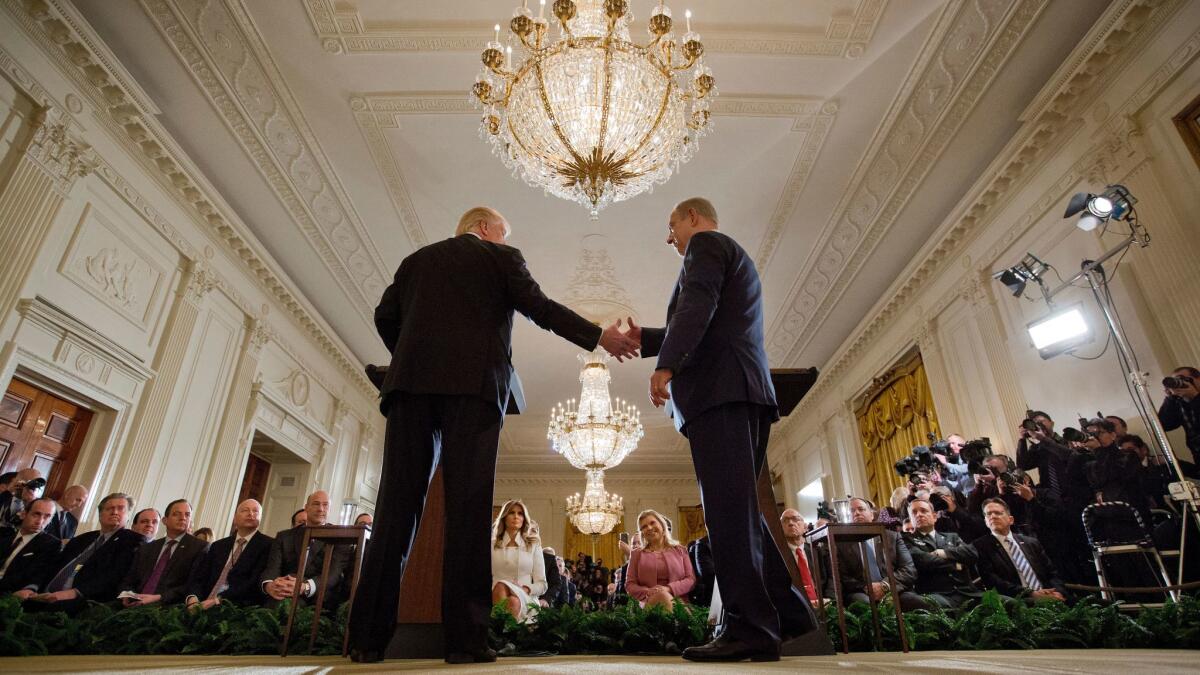Editorial: Trump just casually demolished the two-state solution to the Israeli-Palestinian conflict

- Share via
President Trump on Wednesday casually demolished a pillar of U.S. foreign policy under both Democratic and Republican administrations: the belief that the way to resolve the Israeli-Palestinian conflict is for Israel to live side by side in peace with an independent Palestinian state.
That so-called two-state solution obviously faces formidable obstacles; negotiations are virtually moribund at the moment. But unless and until someone comes up with a better plan, the effort to create two separate states is the only conceivable way to preserve Israel as a democratic and a Jewish state and to allow Palestinians to govern themselves. Neither side will agree to less.
Trump claims to know better.
“I’m looking at two states and one state, and I like the one both parties like,” he said at a news conference as Prime Minister Benjamin Netanyahu looked on. “I can live with either one.”
To someone utterly ignorant of the history and politics of the Middle East, Trump’s comment might have sounded refreshingly flexible and open-minded. But the idea that Israelis and Palestinians could agree on the arrangements for a single state is absurd.
Yes, some Israelis favor a version of a single-state solution in which Israel would annex the West Bank — but without giving Palestinian inhabitants of that territory full citizenship and full voting rights. (If they did, the sheer demography of the new state would mean the end, effectively, of the Jewish state.) Obviously, most Palestinians would not embrace a one-state solution in which they were denied full rights.
For their part, Palestinian supporters of a single state conceive of it very differently — as a binational, secular or even Islamic state. That would be anathema to Israelis because it, too, would mean the end of the Zionist dream.
A single state that would be agreeable to both sides isn’t the “ultimate deal” of Trump’s imaginings; it’s the ultimate fantasy.
Still, by floating that possibility, Trump undermined U.S. support for the two-state solution and relaxed the pressure on Netanyahu, whose support for the idea has always been halfhearted at best. At Wednesday’s news conference the prime minister welcomed Trump’s comments and said that he wanted to “deal with substance, not labels.”
Trump long has suggested that he could capitalize on his skills as a business negotiator to bring peace to the Middle East. Recently he tapped his son-in-law and advisor, Jared Kushner, as his representative in the region, though Kushner has no experience as a diplomat.
I think we’re going to make a deal,” Trump said on Wednesday. “It might be a bigger and better deal than people in this room even understand.” But it’s hard to imagine such a deal that didn’t involve a democratic Jewish state and an independent Palestine — the very two-state solution Trump has now dismissed as dispensable.
Follow the Opinion section on Twitter @latimesopinion or Facebook
MORE FROM OPINION
Trump owes his working-class supporters a better Labor secretary than the terrible Andy Puzder
Leaks, like the ones that did in Michael Flynn, are a great American tradition
How to make your voice heard in Washington
More to Read
A cure for the common opinion
Get thought-provoking perspectives with our weekly newsletter.
You may occasionally receive promotional content from the Los Angeles Times.










